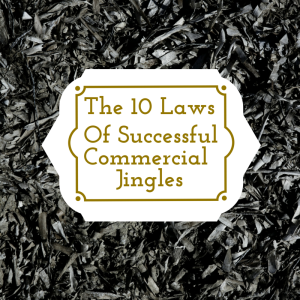
18 Dec The 10 Laws of Successful Commercial Jingles
The 10 Laws of Successful Commercial Jingles
The best comercial jingles stay in your mind long after you hear them on radio or TV. If a jingle is effective, people keep singing the words in the shower, at the gym and on the way to work. Who can forget Wrigley’s famous advertising campaign that featured attractive twins chewing Doublemint gum? The company hit gold with a catchy tune and the lyrics “Double Your Pleasure, Double Your Fun.”
Successful commercial jingles use a variety of techniques to promote a product in a memorable way. Here are 10 important laws to keep in mind regarding your radio advertising.
1) Do Your Homework. Listen to advertising jingles every chance you get. Ask yourself which jingles stand out and which elements especially grab your attention. Analyze the words and the music, and evaluate why they form a compelling combination. Don’t just think about today’s slogans and jingles – look into the past for rich sources of inspiration. Although your jingle should reflect your personal touch, you want to create the same kind of excitement found in the most impressive jingles.
2) Know Your Audience. Listeners decide the success of comercial jingles, so your job is to please them. Always go for lively music and lyrics for a young audience, and come up with a more sophisticated effect if you’re developing a message for an older generation. In either case, you want to captivate your intended listeners by appealing to their tastes, interests and desires.
3) Study Your Business. Uncover everything you can about the benefits of your business and emphasize those distinctive points. In a few short words, you have to clarify why listeners should use your business – rather than a competitor’s business. If you’re selling soup, explain why it’s healthy and delicious at the same time. The same principle applies whether you’re promoting toothpaste, life insurance, fast food, pantyhose or hearing aids.
4) Drive Home the Name. No matter how clever your jingle might be, it won’t make a difference unless your audience remembers the name of the product. The best way to ensure that is repetition, repetition, repetition. The trick is to repeat the business name in a fun way that keeps people tuned in. Listen to the jazzy “Wanta Fanta” jingles for excellent examples of this technique.
5) Put Your Words to Work. Use striking words to describe your business and to get the response you want. Employ verbs that move you, adjectives that paint a picture and nouns that deliver a message. This doesn’t mean you have to use long or fancy terms – strong but simple words are often most effective. The important part is making every syllable count, as Coke effectively showed with its sensational campaign that announced to the world, “It’s the Real Thing.”
6) Lay on the Language. Especially in radio advertising, jingles have to make an aural impact to be successful. (It’s what keeps us singing in the shower.) Use alliteration to make your point – that’s when words start with the same consonant, as in “Peter Piper picked a peck of pickled peppers.” Also try assonance — the repetition of vowels – as in “sea breeze” or “lonesome road.” Rhymes are always popular, but you have to make them original or your final product will sound contrived.
7) Humor Your Audience. People love to laugh, so think about your comercial jingles with that in mind. Use exaggeration and outrageous comparisons. Include puns, but try them out on your friends first to see whether they work. If funny doesn’t blend with your product, go for lively and upbeat. Remember, your audience likes to feel good and a successful advertising jingle helps that happen.
8) Keep Short and to the Point. If you want consumers to sing, hum or whistle your jingle, make it short enough to remember and master. When McDonald’s came out with “I’m Loving’ It,” a new standard of brevity and effectiveness hit the advertising world. Staying short also helps you – and your audience — remained on focused on your business. The public’s attention span is often short, and drawing things out just reduces your impact.
9) Pick the Right Tune. Music sets comercial jingles apart from mere slogans and makes those jingles easier to remember. Original music helps your jingle stand out, but only if the tune is especially snappy or melodic. You also can use existing music if it’s in the public domain. Think about time-honored tunes with modern or unexpected wording for a fresh effect. This technique helps capture multiple audiences, including those who recognize a piece of music from the past and others who are hearing it for the first time.
10) Emphasize Entertainment. Whether your approach is silly or schmaltzy, acidic or endearing, make the jingle as entertaining as possible. Advertising should provide as much pleasure and diversion as the show that’s airing on TV or the music on the radio. The best ads are energetic, clever and amusing, resulting in effortless enjoyment for the listening audience.
Following these laws will help you start thinking about comercial jingles, but success depends on inserting your own personality into the equation. Sure, you want to learn lessons from jingles that have hit it big – there’s no use in reinventing the wheel when it comes to the basics. Beyond that, it’s up to you to make the difference between mediocre and meteoric.
Use everything you have to craft your superstar ad. Remember the jokes that made you roll over laughing when you were a child. Rhyme words in an outlandish way. Use the onomatopoeia you learned in the eighth grade — “the hum of bees” or “a splash of water.” If you fully immerse yourself in your work, the result will be new, fresh and totally yours. After you take the advertising world by storm, your jingle may rank up there with “Double Your Pleasure” on the list of all-time commercial successes.



No Comments